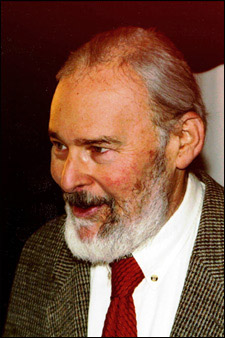Composer, music theorist David Lewin dies at 69

David Lewin, a composer, musician, and music theorist known for his analysis of music of the 19th and 20th centuries, died May 5 from heart disease. He was 69.
Lewin was the Walter W. Baumburg Professor of Music at Harvard, a position he held since 1985. Before coming to Harvard, Lewin taught at the University of California, Berkeley, the State University of New York, Stony Brook, and at Yale University.
Born in New York City, Lewin was studying piano with the renowned teacher Eduard Steuermann by the age of 12. He earned an A.B. degree in mathematics (summa cum laude) from Harvard in 1954, then continued his musical studies with Josef Polnauer in Vienna from 1954 to 1955. He earned an M.F.A. degree in music from Princeton in 1958, studying theory and composition with Roger Sessions, Milton Babbitt, Edward T. Cone, and Earl Kim. In 1958 he returned to Harvard for three years as a junior fellow in the Society of Fellows.
Lewin’s compositions include works for solo piano, solo voice, chamber music ensembles, chamber orchestra, and full orchestra. He also experimented with computer music, working at the Bell Laboratories in Murray Hill, N.J.
He was also actively involved in music performance. As an undergraduate, he served for two years as music director of the Lowell House Music Society, overseeing productions of operas by Handel, Grétry, and Purcell. During the 1966-67 concert season in the San Francisco area, he was producer and pianist for a highly acclaimed performance of Schönberg’s “Pierrot Lunaire.” He also performed in many solo recitals and in duos with voice, violin, and other instruments.
Lewin was a Guggenheim Foundation Fellow in 1983-84, and held a residency at the Rockefeller Foundation Study and Conference Center at Bellagio, Italy. He was awarded honorary degrees by the University of Chicago (1995) and the New England Conservatory of Music (2000). He was a member of the American Academy of Arts and Sciences, American Brahms Society, and the Society for Music Theory (president, 1985-88, life member, 2000). A symposium in his honor on the Schönberg string quartets was held at Harvard in 1998.
His books include “Generalized Musical Intervals and Transformations” (1987) and “Musical Form and Transformation” (1993), which won the ASCAP-Deems Taylor Award. His many articles have appeared in Journal of Music Theory, Perspectives of New Music, Music Perception, Nineteenth-Century Music, and others.
Lewin’s work revolutionized the field of music through his development of transformational networks and related topics. He forged links between tonal and atonal repertories, breaking down longstanding intellectual boundaries. He was a beloved teacher and adviser to a generation of music theorists who are currently active in the United States and abroad.
He leaves his wife June Knight Lewin and son Alexander Julian Lewin.
A memorial gathering is planned for the fall of 2003 at Harvard. Donations to Lewin’s memory may be made to Physicians for Social Responsibility or to Doctors Without Borders.




